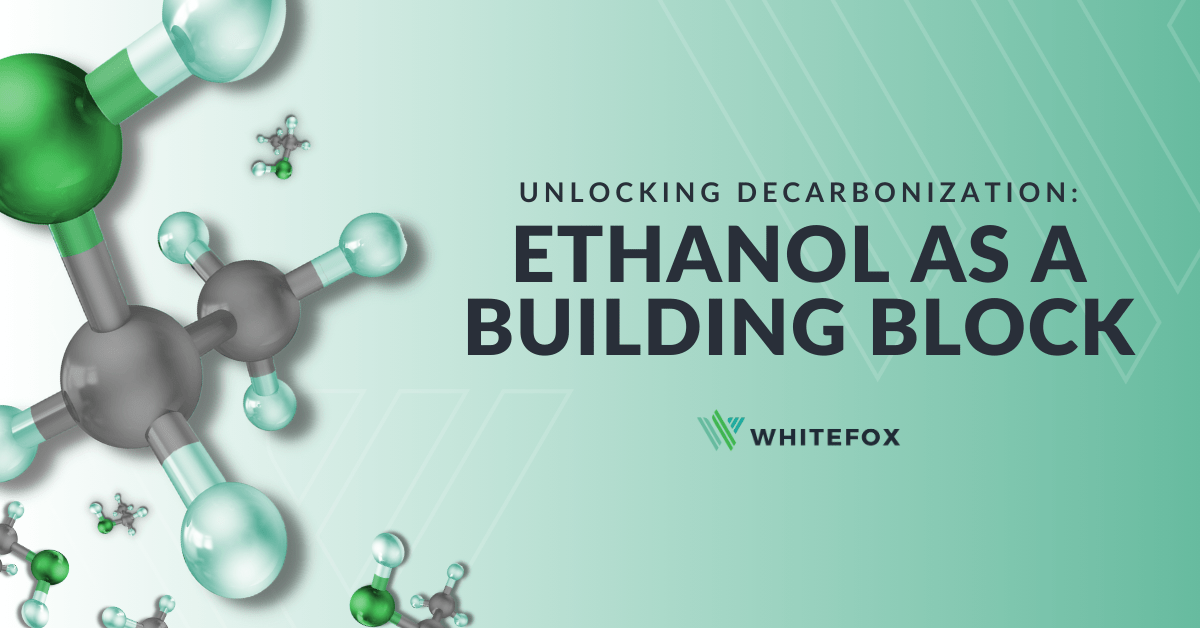<< Back to News

ARTICLE
Unlocking Decarbonization: Ethanol as a Building Block
In the pursuit of a low carbon future, ethanol emerges as a crucial building block, serving as a versatile and renewable platform molecule. Ethanol can play a pivotal role in global decarbonization of the energy sector and beyond.
Throughout October and November of 2023, Whitefox has explored ways to decarbonize the production of ethanol through the implementation of membrane technology, and highlighted the exciting opportunities the industry faces in bringing value to sectors beyond light-duty fuel. Through presentations at the Advanced Bioeconomy Leadership Conference (ABLC) in San Fransisco and the World Ethanol Conference in Brussels, Whitefox CEO, Gillian Harrison brought attention to current/existing opportunities for ethanol to act as a building block for bio-based products on their pathways to decarbonize.
In addition to the in-person engagements, Whitefox led two webinars in partnership with The Digest that featured key components of the ethanol value proposition: (1) The pathway to decarbonize ethanol production through membrane technology and (2) The role for ethanol in new markets, such as green plastics and Sustainable Aviation Fuel (SAF). We partnered with leaders at Braskem and Lanzajet, who have committed to using ethanol as a feedstock for their green chemical and SAF platforms, respectively, to share their reasons behind choosing ethanol and what opportunities/obstacles they face as they scale.
Through the “Ethanol as a Building Block” campaign, we’ve learned a lot about why the ethanol molecule is going to play an important role to achieve a robust global bioeconomy. Getting to Net Zero requires a fundamental shift in our industrial platform, challenging the status quo of using fossil fuels as the primary building blocks for our products and lifestyles, and transitioning to renewable feedstocks for the products we use every day.
Leveraging Ethanol’s Potential
Ethanol’s properties open many possibilities for diversified, efficient processes geared towards Net Zero goals. The ability to transform ethanol into bio-based materials, chemicals and fuels contributes to the diversification of low carbon solutions which can transform the way multiple industries operate, produce, and thrive.
For example, producing ethanol with a low or neutral carbon footprint will stimulate demand for low carbon ethylene, a precursor for SAF. Based on global commitments, we know that there is a multibillion-gallon industry waiting to be seized by companies who can produce SAF with a competitive carbon intensity. In November, we saw 100% SAF used in a flight from London to New York – a milestone to illustrate that technologies exist today to deliver low carbon aviation fuel, but we still have ways to go.
Ethanol also offers an alternative to traditional petroleum-based plastics. By replacing fossil fuel-derived materials with bio-based alternatives, we have products that are required by society, but with a significantly lower carbon footprint that also strengthens rural economies across the globe.
Maximizing our Resources
Ethanol’s role extends beyond being a mere substitute; it becomes a catalyst for change, driving the development of cleaner and greener energy solutions. Innovation must be constant if we are to find better and more energy efficient processes to fully decarbonize.
To reduce emissions and achieve global Net Zero goals, we must significantly reduce energy consumption across all industries, then reuse this energy, and finally reconfigure processes to avoid further use of virgin carbon – Reduce, Reuse, and then Reconfigure. The “Three R” principle has been something we at Whitefox use to approach our projects through energy-conscience engineering that allows us to reduce energy and water consumption by reusing the latent energy in the system.
Energy savings of up to 50%, such as with the Whitefox ICE XL, can be demonstrated in the distillation, dehydration and evaporation part of the plant. By reconfiguring further, the heat integration, savings of up to 90% from today’s baseline can be delivered, opening new avenues for industry to further decarbonize.
A Look to the Future
The rise of ethanol as a platform molecule represents a shift in our approach to driving solutions towards an increasingly low carbon, circular future. Beyond being a biofuel, ethanol becomes a central figure in our future, offering opportunities for innovation, and a cleaner, circular future.
Whitefox remains at the forefront of this journey, not just as a solution provider, but as a catalyst for transformative change and advocate for increased use of ethanol. Together, we’re proving that the hard work of decarbonization is not only possible, but economically viable, and delivers tangible benefits with a reduced environmental impact.
About Whitefox Technologies Limited
Whitefox Technologies, with 22 years of industrial experience, is a leading solutions provider for fuel ethanol and other alcohol production processes. Specializing in technology development and process integration based on proprietary membrane solutions, its efficient designs reduce energy and water consumption in fuel ethanol and other renewable fuel and chemical production processes. Whitefox provides solutions for alcohol producers in the U.S., Canada, Europe, and South America.